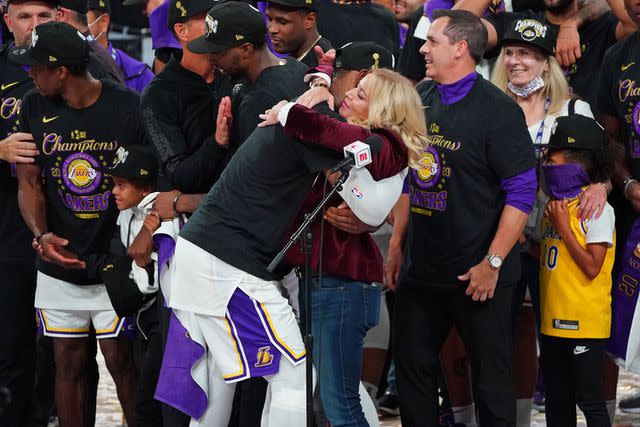Jeanie Buss Says 'Landscape Has Changed' for Athletes' Mental Health: 'Very High-Pressure Jobs' (Exclusive)
- Oops!Something went wrong.Please try again later.
Buss tells PEOPLE about her partnership with UCLA Health ahead of the Wisdom of Wellness mental health summit on May 4

As the landscape of sports changes for professional athletes financially, contractually and physically, Lakers owner Jeanie Buss is emphasizing the need to adapt access to mental health resources for athletes as well.
The advancement of social media and sports betting, coupled with the lucrative opportunities in NIL deals for collegiate athletes, has forced added pressure onto sports stars.
For Buss' players, this isn't new, but the Los Angeles Lakers owner has implemented several mental wellness resources to manage the "challenge" of being in the spotlight.
"Certainly, there are challenges, especially when you're losing and you're on a high-profile team," says Buss, 61. "The pressures are enormous, not only from your fan base, but the media, social media and otherwise," she explains.
Never miss a story — sign up for PEOPLE's free daily newsletter to stay up-to-date on the best of what PEOPLE has to offer, from juicy celebrity news to compelling human interest stories.
At the start of each NBA season, Buss, who will speak at UCLA's Wisdom of Wellness mental health summit on May 4, says her team "added a component of a mental wellness checkup" for players in addition to physical check-ins.

"Not only do we share with the players the different opportunities that we have with them, but we also train our staff so that they can look for signs as well, not only amongst the players, but amongst the staff because these are very high-pressure jobs and they're very visible jobs, but it's doesn't mean that the pressures that they feel aren't any different than what everybody feels every day in a similar circumstance," she explains.
Related:Colton Underwood Talks Lobbying Congress to 'Protect Student-Athlete' Mental Health
Buss says she's noticed a dire lack of conversations around the topic. "What I've found is that there hasn't been a lot of dialogue, enough conversations about mental wellness, especially in the area that we're involved with," she says.
"The Los Angeles Lakers are a worldwide brand known all over the world. Our athletes are strong and dynamic, but they're also human and they're great role models that so many young people look up to," Buss says.
"Using the Lakers as a platform to talk about and continue the conversation about the importance of mental health is something that's near and dear to my heart and I've found that opportunity with UCLA."

Partnering with UCLA Health has allowed the Lakers and Buss to encourage their fans to be proactive about their own mental health. Buss says some of the players are "under such scrutiny" from critics that they have the opportunity "to turn a challenging time into a positive by setting an example" for mental wellness.
Buss hopes her athletes will "take away the stigma" around mental health and let people know that "It's okay to be down" and "it's okay to feel the pressure."
Of course, losing is never the goal, but Buss has figured out a unique way to turn a less-than-ideal product on the court into an opportunity for the team to still make a difference in the community.

Buss explains, "It's how you reach out, where you find your support, what are your coping mechanisms, how are you resilient?"
The Lakers president continues, "For losing a game, how do you come back the next game? By sharing those experiences with each other on a team and also with our community, it turns what could be a negative into something that is a positive and can keep moving forward in a pursuit of mental wellness."
For more People news, make sure to sign up for our newsletter!
Read the original article on People.

